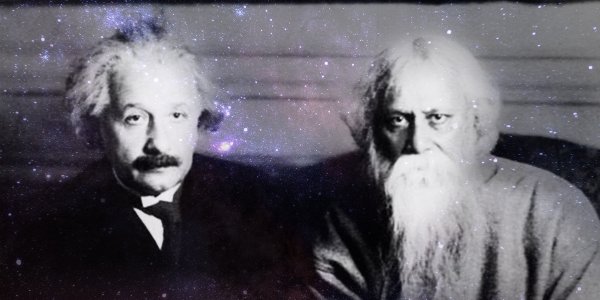Einstein And Indian Philosopher Tagore Met In 1930 To Discuss The Meanings Of Science And Religion, Here Is What They Had To Say
Tags: opinion

An excerpt has appeared detailing a conversation between Albert Einstein and Rabindranath Tagore. Einstein invited the Indian philosopher, musician, and Nobel laureate into his home on the outskirts of Berlin on July 14, 1930. The two of them then proceeded to have a conversation which explored the age-old friction between science and religion.
Reports have stated that “Science and the Indian Tradition: When Einstein Met Tagore (public library) recounts the historic encounter, amidst a broader discussion of the intellectual renaissance that swept India in the early twentieth century, germinating a curious osmosis of Indian traditions and secular Western scientific doctrine.” The following excerpt of the conversation between Einstein and Tagore discusses previously examined definitions of science, beauty, consciousness, and philosophy, combined with the questions of human existence.
EINSTEIN: Do you believe in the Divine as isolated from the world?
TAGORE: Not isolated. The infinite personality of Man comprehends the Universe. There cannot be anything that cannot be subsumed by the human personality, and this proves that the Truth of the Universe is human Truth.
I have taken a scientific fact to explain this — Matter is composed of protons and electrons, with gaps between them; but matter may seem to be solid. Similarly humanity is composed of individuals, yet they have their interconnection of human relationship, which gives living unity to man’s world. The entire universe is linked up with us in a similar manner, it is a human universe. I have pursued this thought through art, literature and the religious consciousness of man.
EINSTEIN: There are two different conceptions about the nature of the universe: (1) The world as a unity dependent on humanity. (2) The world as a reality independent of the human factor.
TAGORE: When our universe is in harmony with Man, the eternal, we know it as Truth, we feel it as beauty.
EINSTEIN: This is the purely human conception of the universe.
TAGORE: There can be no other conception. This world is a human world — the scientific view of it is also that of the scientific man. There is some standard of reason and enjoyment which gives it Truth, the standard of the Eternal Man whose experiences are through our experiences.
EINSTEIN: This is a realization of the human entity.
TAGORE: Yes, one eternal entity. We have to realize it through our emotions and activities. We realized the Supreme Man who has no individual limitations through our limitations. Science is concerned with that which is not confined to individuals; it is the impersonal human world of Truths. Religion realizes these Truths and links them up with our deeper needs; our individual consciousness of Truth gains universal significance. Religion applies values to Truth, and we know this Truth as good through our own harmony with it.
EINSTEIN: Truth, then, or Beauty is not independent of Man?
TAGORE: No.
EINSTEIN: If there would be no human beings any more, the Apollo of Belvedere would no longer be beautiful.
TAGORE: No.
EINSTEIN: I agree with regard to this conception of Beauty, but not with regard to Truth.
TAGORE: Why not? Truth is realized through man.
EINSTEIN: I cannot prove that my conception is right, but that is my religion.
TAGORE: Beauty is in the ideal of perfect harmony which is in the Universal Being; Truth the perfect comprehension of the Universal Mind. We individuals approach it through our own mistakes and blunders, through our accumulated experiences, through our illumined consciousness — how, otherwise, can we know Truth?
EINSTEIN: I cannot prove scientifically that Truth must be conceived as a Truth that is valid independent of humanity; but I believe it firmly. I believe, for instance, that the Pythagorean theorem in geometry states something that is approximately true, independent of the existence of man. Anyway, if there is a reality independent of man, there is also a Truth relative to this reality; and in the same way the negation of the first engenders a negation of the existence of the latter.
TAGORE: Truth, which is one with the Universal Being, must essentially be human, otherwise whatever we individuals realize as true can never be called truth – at least the Truth which is described as scientific and which only can be reached through the process of logic, in other words, by an organ of thoughts which is human. According to Indian Philosophy there is Brahman, the absolute Truth, which cannot be conceived by the isolation of the individual mind or described by words but can only be realized by completely merging the individual in its infinity. But such a Truth cannot belong to Science. The nature of Truth which we are discussing is an appearance – that is to say, what appears to be true to the human mind and therefore is human, and may be called maya or illusion.
More of the conversation between Einstein and Tagore can be read here.
Read Next: E=MC² What The Most Famous Equation In Physics Really Means
THIS ARTICLE IS OFFERED UNDER CREATIVE COMMONS LICENSE. IT’S OKAY TO REPUBLISH IT ANYWHERE AS LONG AS ATTRIBUTION BIO IS INCLUDED AND ALL LINKS REMAIN INTACT.
Leave Comment: